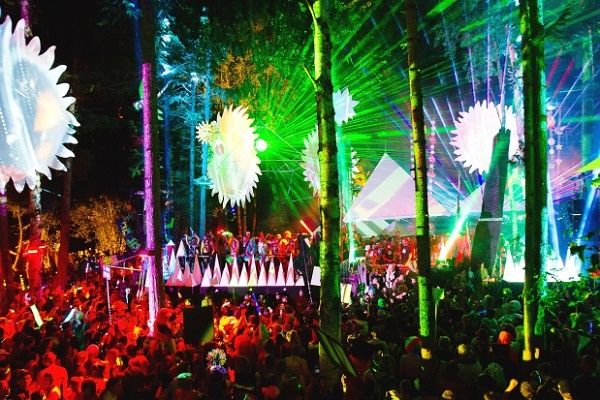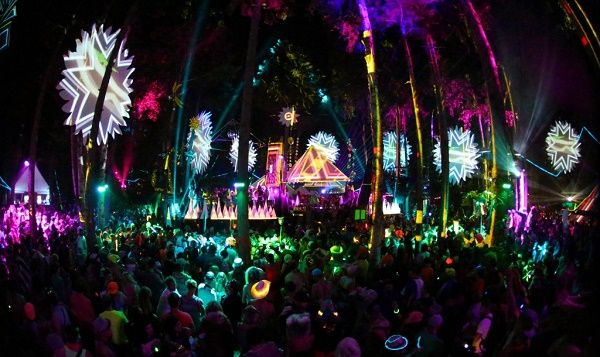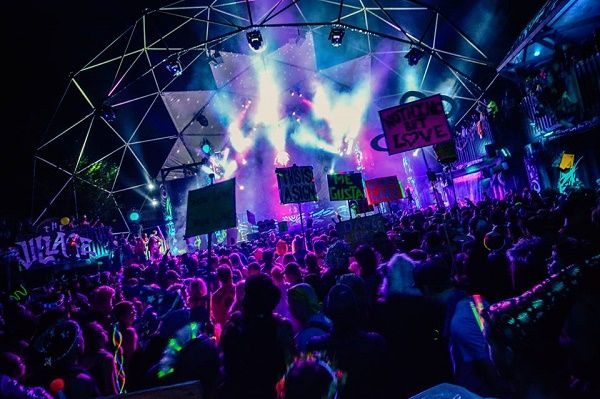

Deriving its name from a religious mythical pure land whose reality is visionary, spiritual and extra-dimensional, Shambhala Music Festival has manifested itself from humble beginnings as Canada’s largest and most revered electronic music gatherings. Heeding inspiration from the origins of its name, Shambhala not only continues to deliver musical and artistic expression in its purest form, but equally advocates human goodness and aspiration, as every crevice of the festival radiates these notions through music, art, sustainability, wellness and sense of community. And, with completely sold out ticket sales this year, winning Best Large Event at The International Breakspoll Awards in 2011 and 2012 and Greener Festival Award at the UK Festival Awards in 2013 and 2014, Shambhala shows no signs of slowing down its impressive momentum, as it continues its natural evolution towards becoming one of the most influential and thoughtful annual celebrations the electronic music world has ever seen. As a festival that’s loaded with 6 jaw-dropping stages, an undeniably radiant personality, and a reputation that precedes itself, we were fortunate enough to chat with Shambhala’s family member (aptly referred to as “ShambhaMom”) and Social Media Director, Britz Robins, to learn more about what makes this Canadian festival shine so brightly among the rest of the pack.
Shambhala’s underlying roots are extremely unique in that it has been and always will be a family affair. Since its humble beginnings in 1998 on the Bundschuh family’s Salmo River Ranch, Shambhala has been operated and supported solely by the Bundschuh family and a plethora of eager volunteers, completely rejecting any and all corporate sponsorship. This highly commendable and one-of-a-kind feature of the festival pushes the idea that everyone who becomes involved makes a direct impact in defining and shaping Shambhala. As an integral part of the festival’s family, Britz told us her thoughts on this endearing, homegrown facet of the festival:
“For me its really all about the community, and I think a lot of the people around here would say the same thing. One of the things that’s really unique about Shambhala is the fact that we all live and work in the community that we have this festival in.
A lot of festivals, you scramble to get your venue, it’s maybe like five hours or more away from where you actually work, but I think the fact that we’re actually a part of this community really kind of trickles down into the essence and vibe of the festival. And in turn, our festival-goers treat each other like community, too, and I think that’s a really cool aspect of Shambhala.”
She then illustrated just how influential the presence of the festival’s attendees are and how the natural sense of oneness and encouragement of self-expression shapes the festival’s personality by explaining:
“We actually have a lot of attendees saying ‘Shambhala should do this, Shambhala should do that’ and we’re focusing on the big stuff, but if you want to take this and make it an event and invite people to it on Facebook and make it happen, we’re like, ‘go for it.’
So the result of that is a lot of attendee organized events and themed costume days that a bunch of strangers get involved in together, and end up meeting people because of it. We really encourage people to take their creativity and express it, and so I’d say that Shambhala attracts a lot of creatives and open minds and free thinker types.”
She added:
“So you get all these interesting little theme events (like potlucks, organized unicorn stampedes, “anti-festival day” where attendees dress like parents and tourists with fanny packs and unicorns versus zombies walks, just to name a few), and there’s tons of little things that people are like ‘let’s just do this,’ so it’s really cool. It’s really cool to see people feeling empowered to get creative and make opportunities to connect with other people.”
Along with Shambhala’s undeniable avocation for personal creativity and self-expression, the Canadian festival is known for having a sort of small town vibe and sense of togetherness compared to much bigger festivals, as Britz explained that it’s not uncommon to see “people smiling and waving as they walk past and people are a little bit more open to engaging with people they don’t know.”
She continued, “I think it’s a really nice in between that makes it kind of comfortable to interact with people you don’t know. And in terms of personality, I’d say Shambhala is just like a small town part of your personality that happens to attract people from cities all over the world.”
And, with such an inviting, small town feel, Shambhala seems to entice a certain type of person to its grounds. Britz further elaborated on what makes the personality of this festival shine so robustly by explaining:
“I think it just attracts people who are opened to experiencing new things, people that are opened to meeting other people and there’s a certain level of collective silliness and people will just walk by and do something totally ridiculous and totally engage other people in what they’re doing. There’s a certain level of playfulness and not only playfulness within the group of people that you already know but including other people within that.”

Seeing as Shambhala is a unique and elevated festival experience unlike what most people, even within the festival community, are used to, Britz offered some words of wisdom for this year’s newcomers. She advised:
“Try not to get too wrapped up in your own schedule. The hardest thing to do is kind of figure out where you need to be, when, and I feel like, especially at Shambhala, if you get too wrapped up in that you miss out on all these weird little magic moments. For an example, a couple years ago, on Sunday morning, there was like a 2 hour beat-box session, totally unplanned, and the guy beatboxed for like 90 minutes straight, it was insane. But you know, if you’re so concerned with your schedule where you gotta be and when, you miss out on things like that.
So my biggest advice would be, even if you feel like intellectually you want to be somewhere else and see a certain act, just kind of go with what you’re actually feeling in your heart because that’ll lead you to way more interesting places. There’s so much you can experience at a festival than just music, and just make sure you take in a lot of that experience as well.”
As for Shambhala’s seasoned veterans, Britz had some information to divulge about the festival’s upgrades and surprises for this year’s installment. She informed us:
“There’s a big surprise in the Fractal Forest, that’s all I can tell you. And we actually have a couple different food and beverage things that we manage on site. We used to have tea, but that’s becoming a coconut lounge, so we’re selling fresh coconuts on site, and that’s gonna be a super big, nice thing for people to just take to the river and relax. There’s actually a lot going on in the background, a lot of the stuff we’re doing this year that people wouldn’t actually necessarily know. We put in a huge, huge waste treatment facility on site, so that’s kind of a step towards making Shambhala more sustainable rather than having to truck all the waste from on site off to another location. So there have been a lot of infrastructure upgrades this year that the guests wouldn’t necessarily see, but it helps us in our steps towards being a more sustainable festival and in terms of running more smoothly. Hopefully that’ll be felt on the grounds as well.”

Being such an integral part of the Shambhala family, the ShambhaMom shared with us some of her favorite things that comes with the privilege being so closely involved in creating such a magical and lively celebration. She explained:
“One of my favorite moments, this is kind of something I do every year. The Pagoda is kind of the central stage and it looks over on the main ground and it’s kind of a three story structure, and the last level is really tiny and you basically have to climb up this little latter like you’re climbing up into a tree house, and so once all the stages are going, it’s usually on Friday as the sun’s going down, I’ll climb up there and just look out at all the lights coming up and it’s like ‘ahh, I was a part of this, I helped make this happen, and all these people are having a really good time because of the team that I work with’ and it’s just such an amazing feeling. That’s one of my personal favorites every year, sometimes I cry.”
She concluded:
“For me, its really connecting with people, and that’s one of my favorite things about festivals. Obviously I love music and I love dancing, I love it so much that festivals became my life. But the thing about festivals is people are in such an openhearted state, much more than they are in day to day life and it makes it really easy to have these really profound, deep heart connections with people. I don’t know how many times over the years, especially doing my job because a lot of people recognize me and so people will come up and thank me on behalf for the festival, so I kind of accept the gratitude on behalf of everyone else out here. And the things people tell me, the deep, deep beautiful things people tell me; the way people tell me Shambhala changed their life and things like that, it’s such a beautiful, amazing thing. And you know, obviously, I’m on the receiving end of a lot of emotion because people recognize me as someone who works with the festival, but I do think people have those experiences, maybe not as intense and constant as I do, but those moments are happening out there all over the festival. You meet people and you really connect and it’s just this beautiful thing. Like I said, I’ve been going to this festival for 13 years, and some of my best friends, people that I’ve met out here are still my best friends, it’s a really beautiful thing. Even if I only see them once a year out here.”

From inside the confines of the festival grounds, Shambhala’s attendees are treated to world class music, high profile art, spiritual opportunities and workshops, a top notch water system, psychiatrists, doctors and women’s safe space, and its food vendors and volunteers are supplied with local ingredients, vegetables, beef and pork grown and raised on Salmo River Ranch, all encased in a scenic backdrop. But Shambhala’s weekend long lifestyle utopia doesn’t stop once the festival ends, as some of its crew members have extended their efforts to educate and advocate for substance testing services to other festivals and at the International Music Festival Conference, as well as made appearances on a panel with the head of emergency services at Burning Man, Dance Safe, and the International Drug Policy Alliance. Last, but not least, Shambhala Music Festival LTD is planning to launch a new, multi level establishment within the next year or two that includes a 13 room boutique hotel, “Farm Fresh” grab-and-go diner, sit down restaurant with live music and entertainment space called “The Falls” and the recently opened and highly anticipated “Bloom” nightclub. Aside from its booming and infectious personality as one of the world’s most revered and thoughtful electronic music festivals, Shambhala’s philosophies can easily be transformed into a commendable lifestyle muse that we can all learn and take examples from.
If you’re lucky enough to join in on Shambhala’s 18th celebration, taking place from August 7th through the 10th, check out the festival’s schedule here, and be sure to keep up with the festival’s mix series below!


